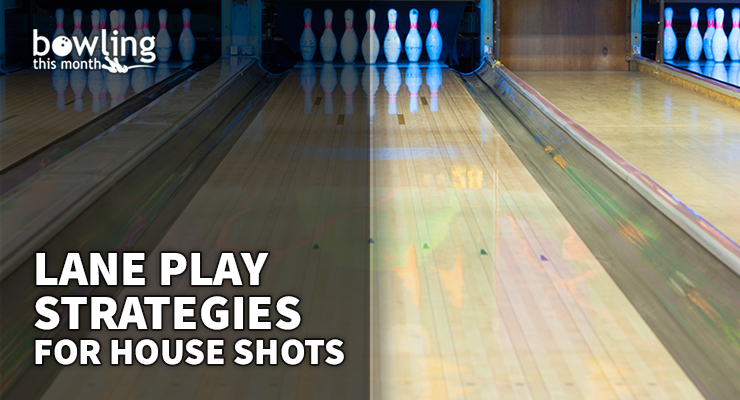Article Contents
- 1. Basic adjustment strategies
- 1.1. Angle changes
- 1.2. Speed changes
- 1.3. Ball changes
- 2. Strategies for warming up
- 3. Adjusting for strikes
- 3.1. What you saw
- 3.2. Why it happened
- 3.3. What to do about it
- 4. Adjusting for corner pin leaves
- 4.1. What you saw
- 4.2. Why it happened
- 4.3. What to do about it
- 5. Adjusting for splits
- 5.1. What you saw
- 5.2. Why it happened
- 5.3. What to do about it
- 6. Closing thoughts
Note: This article is only available to Bowling This Month subscribers.
Last time, we talked about what a house shot is, the different kinds of house shot league bowlers, and the balls that they use. Now, let’s talk about house shot lane play and adjustments.
Unlike sport or PBA/PWBA oil patterns, house shots can be played side-to-side rather than front-to-back. Since house shots have dry outsides, we want to find out how far these dry outsides extend. Once we know this information, we can—in theory—intentionally roll our balls into that dry outside part of the lane and allow the friction between our ball and the lane surface provide hook into the pocket, hopefully resulting in a strike. We can also use the inner heavier oil to hold the ball on-line if we miss inside.
Basic adjustment strategies
There are many different adjustment methods, most of which have already been discussed in Bowling This Month’s pages in detail. In following the theme of my article in which we discussed the importance of maintaining an uncluttered bowling mind, I’d like to focus on three basic adjustments: angle changes, speed changes, and ball changes.
Angle changes
One of the old bowling adjustment adages is, “Miss right, move right; miss left, move left.” On a house shot, where the dry outside boards create friction and hook and the oily inside boards create skid and hold, this general principle applies, but let’s rephrase it to make it more useful for our modern game:
Miss the pocket to the right, move the ball to the right; miss the pocket to the left, move the ball to the left.
If I missed the pocket to the right, and my ball contacted too much of the 3 pin (2 pin for a lefty), I want to use more of that lane friction to the outside part of the lane, so I will move my feet to the right (left for a lefthander). Now, if my shot hit the headpin dead-on or even crossed over, I ...
Already a premium member? Click here to log in.


 (Only
(Only 